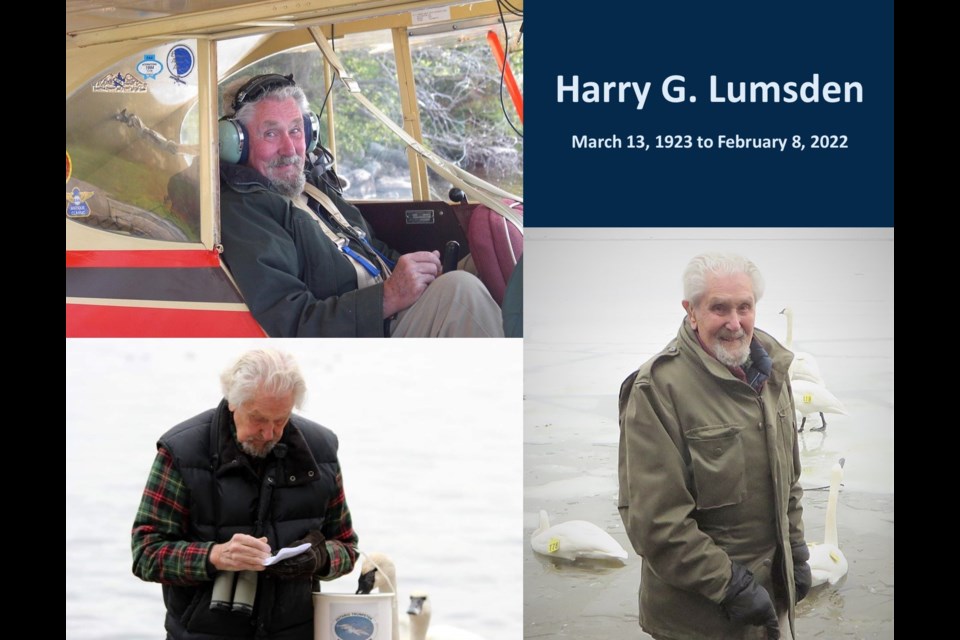Area residents owe a debt of gratitude to Harry Lumsden.
Lumsden, who died earlier this month at the age of 98, was a biologist who started the program to bring trumpeter swans back to Ontario.
In a release, his role as the visionary and mentor in reintroducing the species is celebrated by Lumsden’s family and the Wye Marsh Wildlife Centre, which also played an integral part in the trumpeter swan’s return to the province.
“Over the years, we have had the honour to stand beside this modest man who only ever wanted to draw the attention to the swans rather than himself,” the statement notes. “Harry shared with us his dream, his knowledge, and his passion of trumpeter swans. It is because of his vision we must give credit for the beauty of the trumpeter swans we see today in Ontario.”
The statement goes on to note that Lumsden was a man of great accomplishments and a life well lived; full of legacies and respected worldwide for his work in rehabilitating the trumpeter swan population in Ontario.
The Wye Marsh Wildlife Centre also worked closely with Lumsden as he began the provincial reintroduction program in the early 1980s to reestablish North America's large extant waterfowl in its former habitat and range.
Originally native to Ontario, the trumpeter swan's extirpation from eastern Canada more than 200 years ago was primarily due to hunting pressure and habitat loss.
“With prime wetland habitat, and archaeological evidence confirming the historical presence of trumpeters in the Wye Valley, Wye Marsh Nature Centre became a co-operator in the restoration of this magnificent species in 1989,” the wildlife centre noted.
The original captive breeding pair of trumpeters at Wye Marsh were Big Guy and Lady Girl, who successfully raised the first cygnet in 1990 — Pig Pen.
In 1993, Pig Pen and her mate became the first wild nesting pair of trumpeters in Wye Marsh in more than 200 years.
Lumsden, who was a self-taught biologist/ornithologist and a “life-long student of birds,” often shared a story from his childhood.
“I have always been interested in birds right from being a small child. I remember fairly vividly when I was about four years old, being taken by my father to look at a song thrush nest.” said Lumsden. “The bird was flying around making alarm calls.”
From then on, Lumsden’s curiosity became enamoured by the mysterious behaviour of the birds. And his modest lifetime passion for birds did not go unnoticed.
In 2003, he received the Order of Canada Award, and the following year became a Member of the Order of Canada, one of the highest honours for his outstanding contribution to wildlife management and conservation.
“He provides a strong example of how, by working together, we can make a lasting contribution to conservation,” the Order of Canada Award committee noted.
“A retired biologist and research scientist with Ontario's Ministry of Natural Resources, Harry Lumsden is an international authority on the grouse family and waterfowl."
Lumsden also shared his vast knowledge of aviculture with the general public and inspired volunteers to follow his lead.
“Known for his passion and dedication, he continues to stimulate public interest in wildlife conservation,” the Order noted.
In 2012, Lumsden received the Lieutenant Governor’s Ontario Heritage Award for Lifetime Achievement for his work with the trumpeter swans. The prestigious award honours individuals who have made contributions to preserving, protecting and promoting community heritage for 25 years or more.
The statement released by his family noted that while many prestigious awards hung on his walls, Lumsden would humbly smile and comment during an interview, “Please don’t say anything about that stuff, I don’t want to give the impression that I am more than I actually am. I just love swans.”
The statement added: “May you rest peacefully and fly high with the beauty of your legacy that now grace the skies throughout Ontario, your beloved trumpeter swans. It has been an honour to know you.”
Lumdsen, who is survived by three daughters and three grandchildren, was born in Scotland and came to Canada during World War II after he joined the Royal Air Force.
Like other British pilots, he was stationed in Canada on a three-year tour of duty in Alberta, Saskatchewan, Ontario, and Nova Scotia.
During a one-week vacation from his tour, he had the opportunity to meet with the staff at the Royal Ontario Museum, which proved to be a turning point in his keen interest in birds.
Following the war, he immigrated to Canada and joined the Ontario Department of Lands and Forests to continue his work with birds.
For the next 35 years, he conducted waterfowl surveys over the Hudson Bay and James Bay region with the Canadian Wildlife Service and the U.S. Fish and Wildlife Service.
In 1982, Lumsden’s work began on a recovery program in Ontario for the then endangered trumpeter swan. After Lumsden’s career headed into retirement, the Ontario Trumpeter Swan Restoration Program became his primary focus.
Together with the aid of private funding and a group of dedicated volunteers, the trumpeter swan's population was estimated in 2007 at 1,000 birds and was classified as a reestablished self-sustaining population in Ontario.
Today, the bird's provincial population is estimated to include more than 2,500 swans.
Those wishing to make a donation in Lumsden’s memory can visit the Wye Marsh, the Ontario Trumpeter Swan Restoration Program or a charity of one's choosing.



